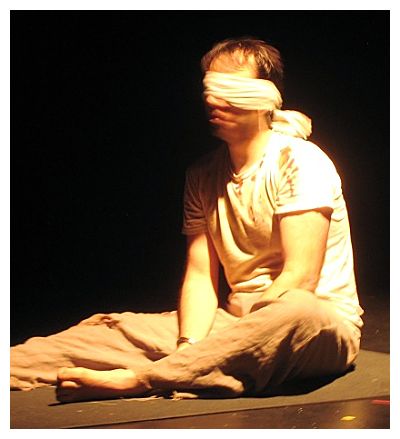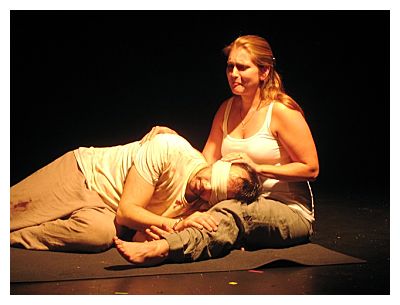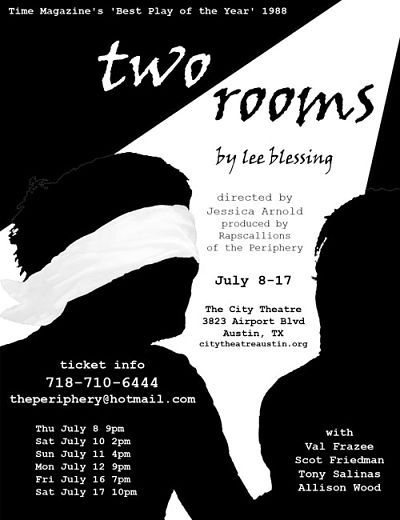Review: Two Rooms by Rapscallions of the Periphery
by Michael Meigs
Maybe I'm the wrong person to review this play.
I did accept the Rapscallions' invitation to see it, and I rearranged my schedule before departing Austin so as to get there for the opening. I empathized immediately with the leads Scot Friedman and Val Frazee as they explored for us the intimate pain for a married couple of his arbitrary abduction in mid-80s Beirut.
That core story is powerful because of its simplicity: abrupt separation, lives torn apart, a forced interiorization of loss and the hallucinatory escape into memories and wishes.

Blessing's framework for that tearing story shows tawdry incomprehension of the realities of the time. He seeks to complement the interior story with an exterior story, a sort of j'accuse, portraying with contempt the imagined actions and attitudes both of the U.S. government and of the U.S. press. He presents us a bloodless State Department official who has been assigned the task of keeping the wife, Lainie, quiet and compliant, and he presents us with a bloodhound reporter convinced that he can bust this story wide open by befriending and betraying Lainie.
As the action went forward and the auxiliary characters pressed Lainie and lied to her, I felt a growing distaste, almost a nausea, and my systems began to shut down. Because I had been there.
Not in Beirut, but certainly in the 1980s and in the 1990s, as a United States diplomat. A friend of ours was among the 60 persons killed in the Beirut embassy bombing of April 18, 1983. A colleague at the embassy in Cyprus, on the way home to the bedside of his dying father, died in the bombing of Pan Am 103 on December 21, 1988. We were trained to watch for surveillance and to elude capture; we were counseled on what to do if we were taken hostage. Over the course of a diplomatic career I visited and counseled Americans sitting in foreign jails and met with family members anguished by deaths, kidnappings and disappearances abroad.
So you'll understand if I don't embrace Blessing's hypothesis that the U.S. government is unfeeling, mendacious and incompetent. I am not particularly attracted by his counter-thesis that the press is equally blind and manipulative. Those assertions, as embodied and enacted by Allison Wood as the white-clad government official with the American flag pin in her lapel and Tony Salinas as the pony-tailed, pushy journalist, do make for some vigorous clashes. Maybe it's provoking drama, but it's not thought-provoking, because Blessing's self-righteous assumptions play to the paranoia of those who look for simple home explanations for extremely complicated clashes abroad. A survey of reviews of this piece done elsewhere, recently, inevitably turns up comments about how relevant it remains, especially in a post 9/11 world.
So let's back away from my fundamental objections to the writer and his message. Let's consider this production, instead.

Scot Friedman's familiar, open face is muffled in this piece, for as the kidnapped teacher from the American University in Beirut he is obliged to wear a blindfold. We meet him manacled and isolated, kneeling on a mat on a bare stage; he speaks, already in something of a delirium, composing an oral letter to his wife Lainie. His captors never appear. His scenes in that series of bare rooms alternate with scenes of Lainie in his office at home in the Washington suburbs. She is on a short leash, watched by the specially assigned government official and aggressively courted by the journalist.
Tony Salinas makes the journalist Walker Harris likeable, energetic and short-sighted. Allison Wood could have done more, I think, to create a deeper, perhaps more conflicted picture of the completely unreal portrait of the State Department official. I found throughout my career that the Foreign Service was peopled with vivid, articulate individuals -- yes, including a goodly helping of the egotistical and the self-aggrandizing. But almost without exception, those with political and consular responsibilities were endowed with frighteningly acute abilities to assess others and to play to their needs and motivations.
But there I go again, allowing memories and my own realities to intrude in an imaginary world.
Strongly positive review by Ryan E. Johnson at examiner.com, July 15
Portmanteau review by Bastion Carboni at austinist.com, July 23
EXTRA
Click to view transcription of program for Two Rooms
Two Rooms
by Lee Blessing
Rapscallions of the Periphery
